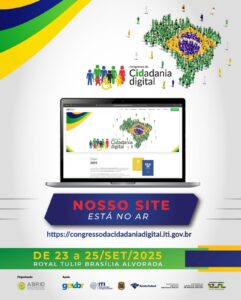In an interview with Crypto ID, the director-president of the International Institute of Identification (InterID) and president of Abrid (Brazilian Association of Technology Companies in Digital Identification), Célio Ribeiro, comments on the directions of the unique identity project in Brazil with the election of new government
Last Sunday, the 30th, more than 118 million Brazilians went to the polls to choose the next president of Brazil. After the result, sectors of society may wonder about the future and whether their agendas will be included in the new government’s programs.
In the identification sector, which for almost 40 years has faced political obstacles to implement the long-awaited unique identity of the citizen, concerns can be expressed by the continuity of the National Identity Card (CIN) and by the necessary continuous modernization of identification institutes.
To shed light on the topic, Crypto ID publishes an interview with Célio Ribeiro, who commented on these and other aspects of identity in Brazil.
Crypto ID: You are one of the biggest names in the ID sector in Brazil. With the new government, do we run the risk of slowing down the new and already underway National Identity?
Célio Ribeiro: In August 1983, Law 7116 established the issuance and validity of the identity card in Brazil, the famous RG. However, only in 2022, through Decree 10,977, there was the proper governance regulation with the institution of the National Identity Card (CIN). In my opinion, there is no possibility of slowing down the implementation of this project. It is essential for the Brazilian State and its federative units that this initiative move forward as quickly as possible. We can no longer delay this much-needed identification of the Brazilian, with modernity and security. The theme of identification is basic in any society. In Brazil, unfortunately, it was stopped for a long time, many things did not go as they should and several people involved in the theme were unable, for various reasons, to give the necessary sequence.
Crypto ID: We have almost 40 years of identity legislation in Brazil. RIC, IDN, DNI have already been discussed and now we have the CIN. Why was there so much dispute over this topic?
Célio Ribeiro: Regulation has always encountered difficulties in modernization, as the federation units have very regional characteristics and conditions. In 2010, we had the launch of the Civil Identity Registry (RIC), a great step towards a modern and secure identity that, unfortunately, did not continue in the following government. After that, the project came to a halt. We managed to work so that the CIN would come to occupy this fundamental space in the identification of Brazilians. The name doesn’t matter, what matters is that we have, I repeat, a modern and, above all, secure identity. The work that has been developed needs to be increasingly improved and intensified. This is a theme that deals with many fundamental issues: citizenship, the main one, the right of the individual to identify himself, the right to exist before society, in addition to the never negligible public safety. It is essential that people be individualized, so that each one bears the consequences of their actions. This individualization would prevent certain people from impersonating others and from innocent people paying for crimes they never committed. There needs to be governance, and it is being done. I believe it will continue.
Crypto ID: 12 years ago, you handed over, by hand, the identity card to then President Lula, the same one he showed after voting in the second round. How do you assess the perception of the elected government on the issue of identification?
Célio Ribeiro: I would say that the image of president-elect Lula, showing his identity card, the RIC, issued in 2010, next to his voting slip, demonstrates exactly what we are talking about about identity. It is the pride that the citizen has to carry his identity, to show that he is identified, to demonstrate citizenship. This image speaks for it all, it represents exactly what we want to say about the ID card. It is it, the identity, that identifies the person, that guarantees citizenship.
Crypto ID: The topic of identification, whether in past or current governments, seems to face many political barriers to moving forward. Why does this occur?
Célio Ribeiro: As I said before, the issue of identification comprises several fundamental issues. It is regulated by the Federal Government and executed by the federative units of Brazil. There are 26 states and the Federal District, each with its own structure, type of government and interests. Our mission has been to conciliate, gather and aggregate efforts. Today, identification in Brazil is being seen as an instrument of citizenship, finally. It is also seen as something essential to bring citizenship to the four corners of Brazil. Certainly, with this vision present in all states, the project will be implemented with the proper civil identification of all.
Crypto ID: What achievements in the identification area, in addition to the CIN, that you consider essential to maintain?
Célio Ribeiro: The great achievement in the area of identification is the governance that exists on the subject. The federal government, in an organized way, built a structure capable of providing the federation units with everything needed to issue an identity card. This is a very important legacy. Now, what we need to do is ensure that this integration between states and the Union takes place as quickly as possible. It is essential the exchange of information, the use of biometric data in the units of the federation and, of course, that this database is under the governance of the Federal Executive Branch.
Crypto ID: Do we have a national industry capable of producing more than two hundred million documents? What is your assessment of our technical knowledge and know-how?
Célio Ribeiro: Since the RIC project, Brazilian industry has modernized and prepared itself for this mission of identifying Brazilians. Today we have complete mastery of this technology, and the largest companies in the world are based in Brazil. Currently, the national identification system is operated and supplied by the best and most experienced manufacturers of security documents and the biggest and best biometrics companies. Brazil has full capacity to offer the best product with the best technology in the world. We currently have no lag in this regard.
Crypto ID: We have already spoken in other opportunities about the need to modernize the identification institutes. What is their current stage and what progress has been made in achieving such a large project?
Célio Ribeiro: The modernization of Organs official Brazilian identification bodies is fundamental, and this is being done and will continue to do so. One of the most important things about federal governance is exactly helping the federation units. As it is a state project, everything that is being done is not punctual, but with the aim of moving the issue forward, of prospering as a state issue and not as a political issue, regardless of who is in the field. power. Identification should be treated like this. We need to ensure that the federation units are prepared for integration with each other and with the Federal Executive Branch.
Crypto ID: There were currents that defended the idea of a 100% digital identity document. Is this feasible or even safe? Does any place in the world have this model?
Célio Ribeiro: Digital identity is a reality. Since 2007, when we founded Abrid (Brazilian Association of Technology Companies in Digital Identification), we have been working with the mission of responsibly making digital identity systems. It is essential that there is security when talking about a digital document with civil identity validity, and this is not just any document. It cannot be fragile, nor can there be gaps for insecurity. On this path, the digital document must be derived from the physical document, as it is the latter that has legal validity and social scope, as it reaches everyone’s hands, including the least favored. An exclusively digital document excludes those who do not have a smartphone or who do not have a good data package contracted. The premise of owning a mobile device is exclusionary. It is not about not having a digital identity, as it makes life easier for many, but it must be aggregating, it must be a “plus”, but not the only version of the citizen’s civil identification document.
Crypto ID: In closing, what do you expect from the citizen’s single national identity project? We are on the right way? Will we finally have a modern, safe and reliable state-issued identity card?
Célio Ribeiro: My expectation is the best possible. In fact, we did very important work in which the Federal Government and federation units, along with industry and organized civil society, came together to finally have a secure and modern civil identity. Today we have an identification system being implemented. There is a lot to do, several challenges, but the important thing is to be sure that this is a State project, to be sure that whoever will be at the forefront of Brazil in the coming years also worked intensely, at the time, to have a strong and secure document. This document, the identity card, must reach the hands of each Brazilian wherever he is, giving each individual the guarantee of his citizenship.
Source: CryptoID



